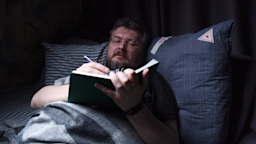Key takeaways:
Insomnia is defined as difficulty falling asleep, staying asleep, or both. If you wake up in the middle of the night and can’t get back to sleep, you may have insomnia.
If you wake up and can’t fall back asleep, you should get up and do something soothing like meditating, deep breathing, or journaling.
Avoid looking at your phone or turning on the TV. The blue light might make it harder to get more shut-eye.
Waking up in the middle of the night can be frustrating. If you can get back to sleep quickly, it might not be so bad. But for people who can’t fall back to sleep, it can be a nightmare.
About 1 in 5 people in the U.S. have trouble sleeping through the night, a symptom of insomnia. These middle-of-the-night awakenings can affect your mental and physical health. They can also impact your quality of life and daytime productivity.
There are things you can do to ease your way back to sleep. And there are things you shouldn’t do as well.
Search and compare options
Quiz: Do I have insomnia?
How can you get yourself to fall back asleep when you wake up at night?
Ever feel like you’ll try anything to get back to sleep? Here are a few strategies that may help.
1. Relaxation therapy
Meditation along with deep breathing exercises may calm your mind enough to ease you back to sleep — especially if you’re used to doing them, said Ann Rogers, PhD, an Emory University professor and sleep expert.
“Research isn’t particularly strong, but those activities are harmless and may help,” she said.
Relaxation exercises include:
Progressive muscle relaxation: Try tensing and relaxing your muscle groups one by one for 10 to 20 seconds at a time.
4-7-8 breathing: To do this exercise, take a slow, deep breath in for 4 counts, hold it for 7 counts, and exhale for 8 counts.
Body scans: Relax and spend time observing sensations for each of your body parts.
2. Quiet activities
Try getting out of bed and doing a soothing or dull activity until you get sleepy again. A few ideas include:
Reading a boring book
Listening to soft music
Playing solitaire
Working on a jigsaw puzzle
Doing a word search or crossword puzzle
Sleep hygiene tips: Good sleep is essential for physical and mental health. Making these simple changes to your sleep routine can help improve the quality of your rest.
Do you need a new mattress? Experts recommend replacing your mattress every 7 to 10 years to avoid poor sleep. Here are signs it’s time to replace yours — and tips to prolong the life of your mattress.
Get the most from melatonin: If you’re taking melatonin to alleviate sleeping problems, you may have questions about when or how to take it. Here, pharmacists share how to use melatonin safely and effectively.
3. Journaling
Journaling has many mental health benefits, like lowering stress and reducing symptoms of anxiety and depression. Try different types of journaling to see which one helps you with sleep.
Journaling themes include:
Gratitude: Jot down the names of people and things you’re thankful for.
Worry: Put anything that’s causing you stress down on paper. Then let it go.
Prayer: Compose a prayer or a word of affirmation for yourself or a loved one.
To-do list: Write down tasks so you won’t worry about forgetting them.
Sketch: Draw simple objects like flowers or seashells.
Read more like this
Explore these related articles, suggested for readers like you.
4. Temperature setting
If you wake up feeling warm or sweaty, check your bedroom temperature. Between 60°F and 67°F is ideal for your body to feel cool enough for sleeping.
5. Visualization
Picture yourself in a serene place like sitting on a beach with tranquil ocean waves or in a garden surrounded by flowers. Think about how relaxed you feel in this environment. Try to imagine your calming place with as many senses as possible, including what you:
See
Hear
Feel
Smell
6. Autogenic training exercises
Autogenic training is a relaxation technique similar to a body scan (mentioned above). The difference is that it includes making statements about warmth and heaviness for your body parts.
Here’s an example of how you might do it in the middle of the night:
Sit in a comfortable chair or lay down on a yoga mat.
Close your eyes and take deep, relaxing breaths.
Space the following phrases 3 seconds apart: My right arm is heavy. My right arm is warm. My left arm is heavy. My left arm is warm. Both of my arms are heavy. Both of my arms are warm.
Repeat until your arms feel calm and move onto another part of the body.
7. Tedious chores
Do something mundane like fold laundry, organize a drawer, or brush your pet. Work on something boring or repetitive that can quiet your mind until you feel drowsy. Then, get back into bed.
Why do you wake up in the middle of the night?
There are many reasons why you may wake up and are unable to go back to sleep. These can include medical conditions, medications, or lifestyle habits.
Some of the more common reasons include:
Drinking alcohol before bedtime
Nicotine use
Stress
Daytime napping
Other causes can be health conditions or medications, such as:
Taking beta blocker medications
Chronic asthma or bronchitis
Arthritis pain
Congestive heart failure
Mental health conditions like depression or anxiety
Snoring or sleep apnea
Restless leg syndrome
Finally, menopause and perimenopause can cause you to wake up in the night, due to:
Hot flashes
Fluctuations in menstrual hormones
Will your body eventually force you to sleep?
Your brain will eventually make you fall asleep. It may not be that night, but it’ll likely be the next night if you were up all night. That’s because a brain chemical, called adenosine, accumulates in the brain while you’re awake, and it makes you feel sleepy, said Jennifer Martin, PhD, professor of medicine at the David Geffen School of Medicine at UCLA. The longer you’re awake, the sleepier you will feel.
What to avoid doing if you wake up in the middle of the night
Some activities can make it harder to get back to sleep. Here’s what to avoid, according to Rogers:
Stop looking at the clock: This can make it harder to fall asleep and stay asleep. It can increase your anxiety. And it can expose you to blue light, if you use your phone as an alarm clock.
Ditch the snacks: Eating in the middle of the night can become a habit and lead to weight gain.
Steer clear of screens: Blue light from screens — phones, tablets, and TVs — can make it harder to fall back asleep.
Don’t toss and turn: Instead, get up and do something quiet. Otherwise, a link may be formed with your bed and not being able to fall asleep.
Skip the sleeping pills: Most sleeping pills are to help you fall asleep, not fall back asleep. Taking them in the middle of the night can make you drowsy the next day.
Say no to alcohol: It interferes with good, deep sleep.
Resist the urge to work: It can stimulate your mind and wake you up. That means no checking your email or messages.
When to talk to a healthcare professional if you have trouble falling back asleep
Waking up in the middle of the night can be a sign that something is wrong. Anytime you notice a consistent pattern of trouble sleeping, it’s a good idea to talk to your primary care provider.
Many mental health conditions can lead to insomnia. And many sleep disorders can cause you to wake up in the middle of the night.
Frequently asked questions
It’s not a good idea to lie in bed if you can’t fall asleep. It can lead to feeling frustrated or anxious. And that can make it even harder to fall asleep. Get up and do something calming in another room until you’re ready to return to bed. And don’t worry about the time.
“Let your mental state be the guide, not your clock,” said Martin.
Start by setting your alarm clock to wake up 30 minutes earlier, said Martin. That’ll make you tired earlier the next evening. Continue adjusting your schedule by small amounts until you’re falling asleep when you want to.
It takes adults an average of 10 to 15 minutes to fall asleep. But it could take you longer depending on different factors: for example, if you’re feeling stressed or anxious, or simply aren’t giving yourself time to wind down before bed. If you consistently take a long time to fall asleep, you may have insomnia. Having good sleep hygiene may help you fall asleep faster.
It’s not a good idea to lie in bed if you can’t fall asleep. It can lead to feeling frustrated or anxious. And that can make it even harder to fall asleep. Get up and do something calming in another room until you’re ready to return to bed. And don’t worry about the time.
“Let your mental state be the guide, not your clock,” said Martin.
Start by setting your alarm clock to wake up 30 minutes earlier, said Martin. That’ll make you tired earlier the next evening. Continue adjusting your schedule by small amounts until you’re falling asleep when you want to.
It takes adults an average of 10 to 15 minutes to fall asleep. But it could take you longer depending on different factors: for example, if you’re feeling stressed or anxious, or simply aren’t giving yourself time to wind down before bed. If you consistently take a long time to fall asleep, you may have insomnia. Having good sleep hygiene may help you fall asleep faster.
The bottom line
Waking up and not being able to fall back asleep can be frustrating. It can make you feel tired and irritated the next day. If you struggle with this symptom of insomnia, try meditating, journaling, or doing something tedious before bed. Avoid doing things that can wake you up, like watching TV or checking your clock.
If these tips don’t work for you, talk to a healthcare professional. They’ll be able to evaluate you to see if there’s something else going on.

Why trust our experts?



References
Ilkevitch, A. (2020). Autogenic training. U.S. Department of Veterans Affairs.
Informedhealth.org. (2022). Insomnia: Relaxation techniques and sleeping habits. Institute for Quality and Efficiency in Health Care.
Iskander, A, et al. (2023). Normal multiple sleep latency test values in adults: A systematic review and meta-analysis. Sleep Medicine.
Kaczkurkin A. N., et al. (2021). The association between insomnia and anxiety symptoms in a naturalistic anxiety treatment setting. Behavioral Sleep Medicine.
Moline, M., et al. (2014). Impact of middle-of-the-night awakenings on health status, activity impairment, and costs. Nature and Science of Sleep.
National Alliance on Mental Illness. (n.d.). Sleep disorders.
National Heart, Lung, and Blood Institute. (2011). Your guide to healthy sleep.
Scullin, M. K., et al. (2017). The effects of bedtime writing on difficulty falling asleep: A polysomnographic study comparing to-do lists and completed activity lists. Journal of Experimental Psychology.
















